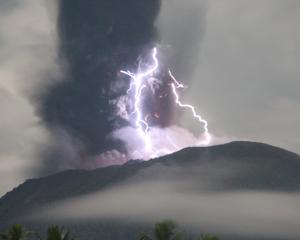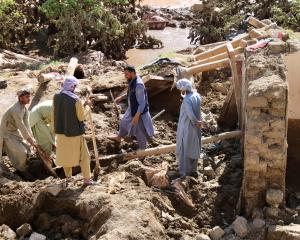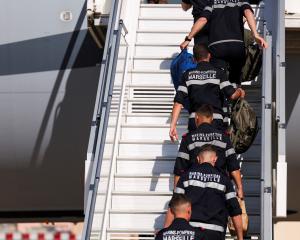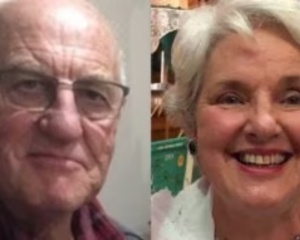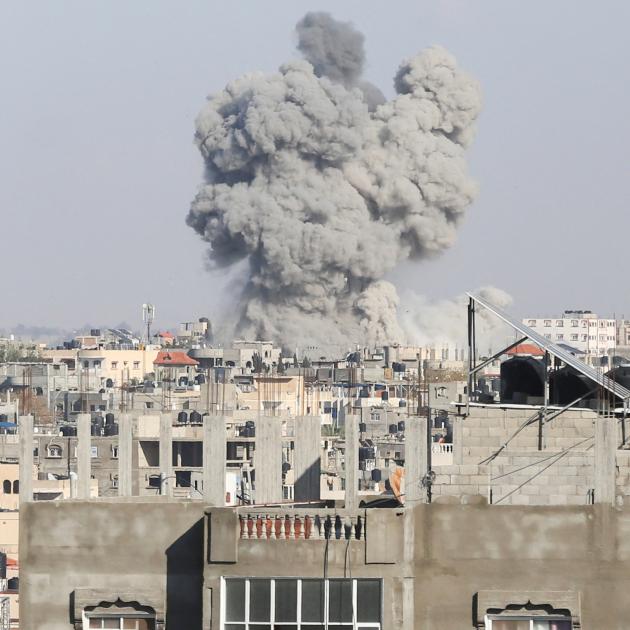
The last-minute moves towards a ceasefire came as Israeli forces struck Rafah on Gaza's southern edge and ordered residents out of parts of the city, which has served as the last refuge for more than 1 million displaced Gazans.
Hamas said in a brief statement that its chief, Ismail Haniyeh, had informed Qatari and Egyptian mediators that the group accepted their proposal for a ceasefire.
The Israeli military said all proposals that would release hostages held in Gaza would be considered, while for now its operations were continuing in parallel.
The war began after Hamas stunned Israel with a cross-border raid on October 7 last year in which 1200 people were killed and 252 hostages taken, according to Israeli tallies.
More than 34,600 Palestinians have been killed and more than 77,000 wounded in Israel's assault, according to Gaza's health ministry.
Israeli Prime Minister Benjamin Netanyahu said on Monday that his war cabinet approved continuing an operation in Rafah in order to pressure Hamas to release Israeli hostages and achieve the country's other war goals.
"The war cabinet unanimously decided that Israel continue the operation in Rafah to exert military pressure on Hamas in order to advance the release of our hostages and the other goals of the war," Netanyahu's office said in a statement.
An Israeli official, speaking on condition of anonymity said the proposal that Hamas had accepted was a watered-down version of an Egyptian offer and included elements that Israel could not accept.
"This would appear to be a ruse intended to make Israel look like the side refusing a deal," said the Israeli official, who spoke on condition of anonymity.
An official briefed on the peace talks, also speaking on condition of anonymity, said however that the offer Hamas had accepted was effectively the same as one agreed at the end of April by Israel.
Jordan's King Abdullah told US President Joe Biden in a private meeting on Monday that an Israeli offensive in Rafah would lead to a "new massacre" of Palestinian civilians and urged the international community to take urgent action.
"The king warned of the repercussions of the Israeli ground offensive on Rafah, which could cause a regional spillover of the conflict," a statement from the Jordan royal court said after Abdullah had lunch with Biden at the White House.
The Jordanian statement said Abdullah in his meeting with Biden "warned that the Israeli attack on Rafah, where 1.4 million Palestinians are internally displaced as a result of the war on Gaza, threatens to lead to a new massacre."
"His Majesty stressed the importance of all efforts that seek an immediate ceasefire in Gaza," it said. "The king and the U.S. president affirmed their commitment to working to reach a sustainable ceasefire in Gaza, stressing the importance of facilitating the delivery of sustainable humanitarian aid to the Strip in light of the dire needs."
The White House said in a separate written statement that the two leaders discussed "the need for an immediate release of the hostages held by Hamas and a sustainable ceasefire that allows for a surge of the urgently needed humanitarian assistance to be delivered safely through Gaza."
In a phone call on Monday, Biden pressed Netanyahu not to go ahead with a large-scale Israeli military offensive in Rafah. Biden has been vocal in his demand that Israel not undertake a ground offensive in Rafah without a plan to protect Palestinian civilians.
US State Department spokesman Matthew Miller said Washington would discuss the Hamas response with its allies in coming hours, and a deal was "absolutely achievable".
"We want to get these hostages out, we want to get a ceasefire in place for six weeks, we want to increase humanitarian assistance," White House national security spokesperson John Kirby said, adding that reaching an agreement would be the "absolute best outcome".
Three-phase ceasefire deal
Based on details announced so far by Hamas officials and an official briefed on the talks, the deal that the Palestinian group said it had agreed to included the following:
PHASE ONE
• 42-day ceasefire period
• Hamas releases 33 Israeli hostages in return for Israel releasing Palestinians from Israeli jails.
• Israel partially withdraws troops from Gaza and allows free movement of Palestinians from south to north Gaza.
PHASE TWO
• Another 42-day period that features an agreement to restore a "sustainable calm" to Gaza, language that an official briefed on the talks said Hamas and Israel had agreed in order to take discussion of a "permanent ceasefire" off the table.
• The complete withdrawal of most Israeli troops from Gaza.
• Hamas releases Israeli reservists and some soldiers in return for Israel releasing Palestinians from jail.
PHASE THREE
• The completion of exchanging bodies and starting the implementation of reconstruction according to the plan overseen by Qatar, Egypt and the United Nations.
• Ending the complete blockade on the Gaza Strip.
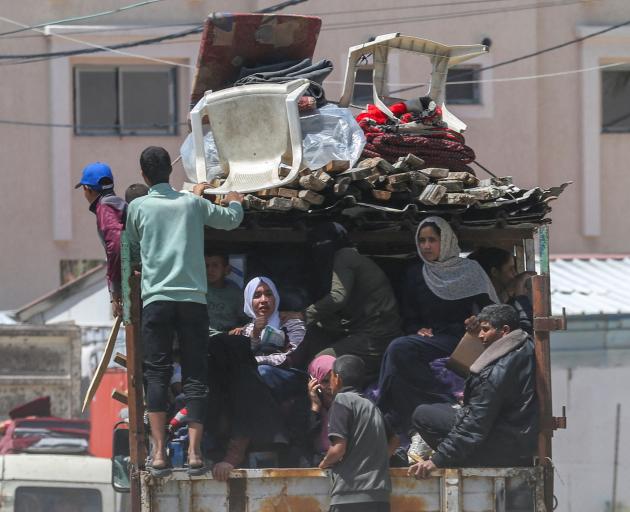
Rafah hit by strikes
Any truce would be the first pause in fighting since a week-long ceasefire in November last year, during which Hamas freed around half of the hostages its fighters captured in the October 7 deadly attack that precipitated the war.
Since then, all efforts to reach a new truce have foundered over Hamas's refusal to free more hostages without a promise of a permanent end to the conflict, and Israel's insistence that it would discuss only a temporary pause.
Taher Al-Nono, a Hamas official and adviser to Haniyeh, told Reuters the proposal had met the group's demands, including reconstruction efforts in Gaza, the return of displaced Palestinians and a swap of Israeli hostages for Palestinian prisoners held in Israeli jails.
The Hamas deputy chief in Gaza, Khalil Al-Hayya, told Al Jazeera television the proposal included three phases, each of six weeks, with Israel to pull its troops out of Gaza in the second phase.
Earlier on Monday, Israel ordered the evacuation of parts of Rafah, the city on Gaza's southern edge that has served as the last sanctuary for around half of Gaza's 2.3 million residents.
Asked during a media briefing whether Hamas saying it accepted a ceasefire proposal would impact a planned offensive in Rafah, Rear Admiral Daniel Hagari said: "We examine every answer and response in the most serious manner and are exhausting every possibility regarding negotiations and returning the hostages."
"In parallel, we are still operating in the Gaza Strip and will continue to do so," he said.
Israel's closest ally the United States has called on it not to assault Rafah, saying it must not do so without a full plan in place to protect civilians there, which has yet to be presented.
Israel said on Monday it was conducting limited operations on the eastern part of Rafah, following a rocket attack claimed by Hamas fighters that killed four Israeli soldiers at the main border crossing into Rafah the previous day.
"We've asked civilians to move out of harm's way. We've been extremely specific about the areas which we'll be targeting...", government spokesman David Mencer said.
Israeli bombardment of eastern Rafah areas continued throughout the day on Monday.
"They have been firing since last night and today after the evacuation orders the bombardment became more intense because they want to frighten us to leave," Jaber Abu Nazly, a 40-year-old father of two told Reuters via a chat app.
"Some families already left, others are wondering whether there is any place safe in the whole of Gaza."
Overnight, Israeli planes had hit 10 houses, killing 20 people, Palestinian medical officials said. The Israeli military said it had struck the site in Rafah from which the previous day's rocket had been launched at its troops.
Instructed by Arabic text messages, phone calls, and flyers to move to what the Israeli military called an "expanded humanitarian zone" around 20km away, some Palestinian families began trundling away in chilly spring rain.
Some piled children and possessions onto donkey carts, while others left by pick-up or on foot through muddy streets.
Abdullah Al-Najar said this was the fourth time he had been displaced since the fighting began seven months ago, as families dismantled tents and folded belongings.
"God knows where we will go now. We have not decided yet."
Nick Maynard, a British surgeon trying to leave Gaza on Monday, said in a voice message from the Gaza side of the Rafah crossing into Egypt: "Two huge bombs have just gone off immediately outside the crossing. There's a lot of gunfire as well about 100 meters from us. We are very unclear whether we will get out."
"Driving through Rafah, the tension was palpable with people evacuating as rapidly as they could."


